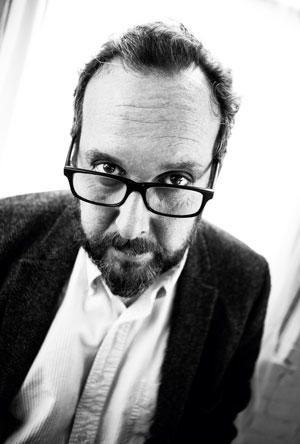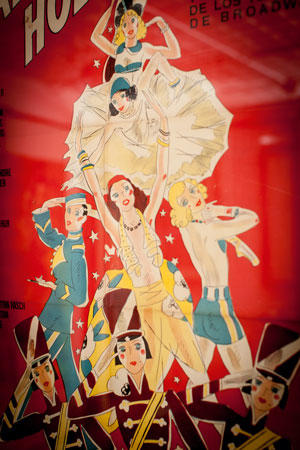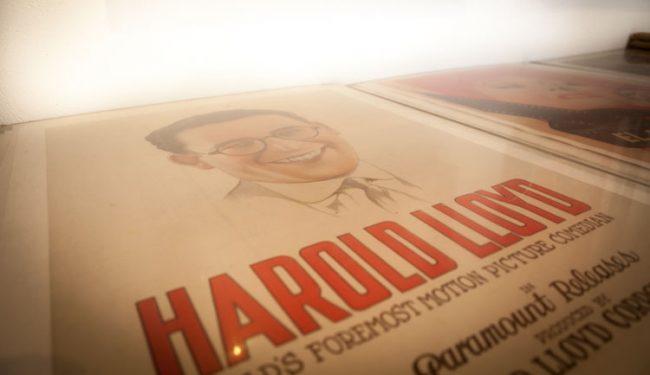“This is the one dividend for whatever kind of celebrity I have in New York,” New York Times film critic A. O. Scott says. “It is the only place in all of New York where I can get a table. I love it here.”
It’s 11:30 a.m. on a bright Thursday and I’ve just met Scott at a back booth at Russ & Daughters Café on Orchard Street, two and half blocks south of the original Jewish appetizing institution. Scott has become a bit of an institution himself at the café and shop, arriving early on Saturdays to grab an early table or number at the counter. He’s been coming regularly for the last five or six years, ever since Niki Russ, the granddaughter of one of the “daughters,” recognized him while slicing fish and struck up a friendship.
“What do you like here?” I ask.
In his Oxford shirt and with a mid-length beard and glasses, Scott, 49, has mastered perennial–graduate student style: a little disheveled, vaguely academic, thoughtful.
“Well, I really like the Gaspe Nova, but the ‘hot smoke/cold smoke’ is good. I like herring so … I like the egg things, too. It’s all, uh … it’s all pretty good. We should share some pickles if you’re interested,” Scott says.
“I’m interested in pickles,” I say, putting my trust in the well-known critic’s taste and ordering the herring plate.
Since joining the New York Times staff in 2000, Scott has become one of the most visible, influential and occasionally controversial critics working in the medium today. His brand of criticism is open-minded, fun and unafraid. He says that his critical bias is toward films that are machines for empathy.
“You have to fight for attention
and clear a way for yourself.”
“Movies, not uniquely but maybe more powerfully and completely than another narrative art form, can show you people who you don’t know, who aren’t like you, or who don’t even exist and compel you to care about them.”
He cites, in almost contrarian fashion, “The Fast and the Furious” movies as examples.
“You are having a great time watching the cars crash, but at the same time you care about these people. EIt’s ridiculous. [But] because of the charisma of the performances, and the way the whole project was conceived and the way it is about friendship, loyalty, solidarity and family, you care about them. It is kind of amazing that you do,” he says.
But he’s also been assailed on social media for his criticism. Most notably, Scott clashed with Samuel L. Jackson over the first “Avengers” film in 2012.
“The secret of ‘The Avengers’ is that it is a snappy little dialogue comedy dressed up as something else, that something else being a giant A.T.M. for Marvel and its new studio overlords, the Walt Disney Company,” Scott wrote in the Times, adding that the film suffered from a “grinding, hectic emptiness” and “bloated cynicism.”
Jackson fired back in a tweet, which served as a rallying cry for other fans to blitz Scott on Twitter:
“#Avengers fans, NY Times critic AO Scott needs a new job! Let’s help him find one! One he can ACTUALLY do!”

As Scott says, “Nick Fury himself released some fury,” But like the blockbuster film, Scott took the blowback seriously, and this February a polemical book emerged from the fray, “Better Living Through Criticism: How to Think about Art, Pleasure, Beauty, and Truth.” The book has helped to reopen the conversation about the importance of criticism and its role in art at a time when social media has given virtually anyone with a phone the platform to engage in criticism.
“The misunderstanding of criticism, or just the hostility towards its existence, is especially strong with fans of superhero franchises movies. They get really, really mad,” Scott says. He’s ordered a mushroom barley soup and the “hot smoke/cold smoke” — a kippered salmon, with a Scottish smoked salmon spread and chips.
“It is all very silly, and if you are a reasonable adult it doesn’t bother you. But I found that it does tap into older, longer standing and more respectable traditions of suspicion against criticism,” he says.
For instance, in an interview Samuel L. Jackson argued that “The Avengers” was just “a piece of bullshit pop culture” that shouldn’t have been taken so seriously by Scott. But in the same interview he claimed that it really “is a fucking great movie” that is beyond critique.
Scott points out that Jackson is tapping into “a reflexive disdain for movies and other low and middlebrow amusements that came so easily to intellectuals of another era” while simultaneously invoking “the ancient, super highbrow idea that a work of art is inviolate and sufficient unto itself.”
In his book, Scott addresses each of those traditional claims against the role of the critic from different angles in six chapters. And he doesn’t shy away from the meat and potatoes. There is nearly an entire chapter devoted to dealing with arguments made in Kant’s third critique. He says the book was influenced by Susan Sontag’s “On Photography,” which is also broken down into six essays.

A.O. Scott
The essays are supplemented with three dialogues. In one, Scott battles a skeptical interlocutor, questioning all his arguments for the essential importance of criticism. “What’s the point of criticism?” the voice asks. “It seems like you can dish it out but can’t take it.”
I ask if the interlocutor was a stand-in for the late media columnist David Carr — who was filmed arguing about criticism with Scott for the New York Times.
“Ha ha yes. Yes, I was working on the book at that point [when the video was made] and it was great. I love that video, and I love David. I miss him. He was willing to go all the way with stuff at the risk, which he never minded taking, of looking foolish himself.”
In the video Carr plays a friendly devil’s advocate. “People are going out for a good time; you’re out to spoil that,” Carr says. “You make it [criticism] sound so warm and cuddly, but in fact you’ll take something people have sweated over, sunk years of their life into, and you’ll grab ahold of it, you’ll look at it and snap it right in half.”
Scott fires back with shorthand versions of the arguments he lays out in his book. “If you are making creative work … you are subject to judgment. This is not a progressive kindergarten. … What you are pursuing is excellence, is truth, is beauty,” he says in the clip.
Scott says the interlocutor is not all Carr. “I think the questioning voice in those dialogues is a little more passive aggressive than David ever was. The dialogues were kind of a way of appropriating the voice that is always there in my head, and out in the world, saying, ‘Who the fuck are you?’ I really wanted to take the question seriously,” Scott says.
…
“The chopped liver is also good,” he says, briefly changing the subject to ponder his food. He says that the soup isn’t too thick here.
“I should come here more often and get gout,” I joke, dipping pickled herring into cream sauce.
“Movies can show you people who you don’t know, who aren’t like you, or who don’t even exist and compel you to care about them.”
“This place was always interesting to me because it serves traditional workingman noshes and flights of caviar. It’s a good representation of how I feel New York is in general,” I say.
“Right! The range on this menu, you can get a knish for $6 or $1,000 sturgeon,” he says.
…
“My childhood was very nomadic,” Scott says.” My parents are both academics and they started out in Madison, Wisconsin. Then we moved to Chicago, North Carolina, to Princeton and Providence. There was a lot of zigzagging and I went to a lot of different schools. I was always the new kid.
“I guess it was sort of an intellectually intense family. There was a lot of discussion and arguments around the dinner table. There was a lot of interest in ideas and a lot of books around. A lot of records. My parents didn’t really let me go to all the different movies. They were a little stricter, as parents were in those days about television. TV was a little bit of a taboo. So as soon as I got my own TV, I just sort of binged for a month.”
“So, what’s an early movie moment that you recall?” I ask.
“I remember — I don’t think it was the first movie I saw, but I was young, probably eight — going to see ‘The Sting.’ I thought it was really, really cool. The plot was hard to figure out, but it seemed very cool. There was swearing in it. And Robert Redford was very charismatic,” Scott says.
“The Sting” swept the Academy Awards in 1973, scoring 10 Oscars nominations and winning seven, including Best Picture, Best Director and Best Original Screenplay.
“In those days they would bring movies back to theaters and I saw ‘Butch Cassidy and the Sundance Kid’ and I was very excited to see ‘All the Presidents Men’ when it came out. I read the book and I saw the movie three or four times. You know, the ’70s was a great time for moviegoing. Especially for age-inappropriate movies. There was this great latitude of the PG rating. There was no PG-13, so you could get a lot in under the barrier of the R.

A vintage movie poster
But like other children of the ’70s, it was “Star Wars” that was the pivotal pop-culture moment for Scott at age 11. Unlike most kids, “Annie Hall,” another movie in theaters at the same time, played a similar role.
“Those movies together remain important, but in different ways. ‘Star Wars’ was the kingdom of fantasy and childhood that seemed to be made exactly for me and who I was then. Whereas ‘Annie Hall’ was much more, as we say now, aspirational. I didn’t understand any of the jokes, it was all sort of sophisticated, but I wanted to be able to crack the code. I want to know what this world is and what this movie is about,” he says.
“It seems sort of like perimeters. One is really big and one is really small,” I say.
“Yes. And I think in retrospect one of the huge influence on my subsequent thinking and taste was probably MAD Magazine in the ’70s. It gave me access to all kinds of things that I wouldn’t have known about otherwise. Like a lot of movies that I wasn’t allowed to see or that I missed would come up in MAD satires, which were really pieces of film criticism in a way. They would draw the frame so well. When you finally did see the movie you felt like you had seen it before. They made jokes that were exactly right for letting you in even if you didn’t really get it,” he says. “If you were an obnoxious smarty-pants kid in the ’60s and ’70s, MAD was your Partisan Review.”
…
“By the way, these pickles are great. I appreciate the introduction to this place,” I say.
“If you ever come here at night you should get the smoked martini,” he says.
“What’s smoked about it?” I ask.”
“There is a Laphroaig [whiskey] rinse, so you get a little smoke. It doesn’t actually have any smoked fish in it. It goes with the cuisine really well though,” he says.
“Nice. I can never drink too much Laphroaig,” I say.
…
“Did you want to make movies?” I ask.
“So, I wanted to write in a vague kind of way. I was probably more interested in the mystique of being a writer than in the actual writing. … I read with great fervor the Paris Review’s ‘Writers at Work.’ [That’s where] they would ask William Faulkner what kinds of pens he used, or ‘Do you wake up early in the morning?’ ‘Do you type your first draft?’ And I fantasized about being interviewed like that.
“I was also interested in criticism in that I read a lot of movie and music criticism. If had a fantasy career at age 14 or 15 it was probably something like ‘Almost Famous,’ [being] a rock critic for Rolling Stone … sitting down with Mick Jagger or Bob Dylan.”
“So, I can put to death the idea that you had secret movie ambitions that failed?” I ask.
“Yeah, not really,” he says.
“It’s just that you brought that up in your book several times, the idea of the critic as a failed artist,” I say.

“Right. It certainly doesn’t apply to movies. I loved movies and I went to a lot of movies. But I never really wanted to be a filmmaker, or a star, or to go out to Hollywood,” he says.
“You had actors in your family. It was never something you toyed with because of that?” I ask.
“Not really. That is a theory that I have encountered sometimes. My mother’s uncle and aunt were Eli Wallach and Anne Jackson. [Both were actors of stage and screen known for films like ‘The Good, the Bad and the Ugly’ and ‘The Shining.’] And my parents actually got married in the apartment where Anne still lives,“ he says.
“Did you ever give them bad reviews?” I say.
“Ha ha, by the time I was reviewing they weren’t doing that much. I do remember Eli showing up in ‘Mystic River’ and thinking, ‘Oh my god, does this mean I can’t review this movie?’ But he shows up only for a few minutes. … But I can’t say [their careers] were an influence on me.”
…
Growing up in the insular world of academia, Scott says that going to graduate school was just what one did. He says he thought about moving to New York and trying to make it as a magazine writer but didn’t have the guts.
In school, Scott had waffled between dissertation topics. Sometimes he was focused on the 19th century, Emerson and Melville, and later he wrote about New York School poets, Robert Lowell and Frank O’Hara. But he never finished his doctoral degree. Later he tried and failed to write “a big critical history of the American novel in the second half of the 20th century.”
Scott’s first reporting assignment appeared in the Nation, where he was paid $0.10 a word to review two volumes of poetry criticism.
“It was like someone unlocked the cage and I could get out. I had always liked writing, and I would sometimes be criticized by my professors for writing too smoothly or glibly or for having too much fun,” he says. “I was reading a lot of popular literary critics from the middle of the 20th century like Mary McCarthy and Elizabeth Hardwick, who were writing in a much more open and democratic idiom. It frustrated me that I couldn’t do that.”
He got more assignments at the Nation, the New York Times Review of Books and the Village Voice and then a job as an “editorial peon” at The New York Review of Books. “It was a good address to have,” Scott says. He moved on to Lingua Franca.
“Lingua Franca was like Spy, it was short lived and had a reputation as a place where a lot of careers got started,” Scott says, describing the magazine as an academic gossip magazine, somewhere between Gawker and The New York Review of Books.
His first New York Times byline appears in 1997 on a review of Bruce Duffy’s novel “Last Comes the Egg” — which, by the way, he gave high marks.
By 2000, Scott had joined the Times as a film critic. Four years later he was named chief critic. But a lot has changed in the last decade, and it’s increasingly common to encounter the argument that professional critics are obsolete.
“I feel like it must be harder than ever to be a critic today. A) Because of social media; everyone is suddenly a critic. And B) because of our current obsession with identity. How do you deal with those things?” I ask. We must be on something like our sixth coffee refill.
“The social media part is sometimes frustrating and exhausting. But it’s also invigorating, because you see who some of your readers are. That is kind of a nice piece of data to have,” he says.
“I think all writers are narcissistic in that way. It’s easy to get obsessed with clicks and tweets,” I say.
“It is nice to have someone almost instantaneously say, ‘That was a funny review,’ or ‘A. O. Scott is an idiot.’ It feeds that narcissism. It also makes the field a lot more competitive. You have to fight for attention and clear a way for yourself.”
“What about the rise of identity politics?” I ask.
“The identity thing is more challenging and I think is something that can’t be dismissed. That is to say, you can’t, for better or for worse, write anymore assuming the transparency or universality of your own perspective. You have to acknowledge where you are and where you are coming from. Which I think is not a bad thing.
“I think also you have to be free to explore the different dimensions of that. I think there is a reductive version of identity, where certain people because of their background or gender or race or class can only, and should only, think a certain way. But a lot of the writers who I admire take a much more expansive and pluralistic view of it: That in fact there is this common world. There is this stuff that we are all watching and thinking about. It’s available to all of us and we are all going to think about it differently,” he says. Scott offers Wesley Morris, a critic at large for the New York Times, and Ta-Nehisi Coates, national correspondent for the Atlantic, who writes about racial politics in the U.S., as examples.
“In a way what the focus on identity means is that you have to be explicit about what has been true all along. Robert Warshow [a mid-20th century critic for the Partisan Review] said, ‘A man goes to the movies. The critic must be honest enough to admit that he is that man.’ Pauline Kael [a highly influential film critic for the New Yorker] would never pretend that she was anyone but Pauline Kael, going to the movies and writing about them the way she did,” he says.
“Do you think that at its worst, that it can be censoring? That this voice is saying, ‘You aren’t this sort of person, so you can’t write about this?’” I ask.
“Who’s stopping you? You can get called out and criticized in ways that feel very unfair. It can sometimes be very knee-jerk and unthinking, but that is always true. There will always be people who read you wrong or unsympathetically or don’t give you the benefit of the doubt you feel you deserve. But that’s just what it is to write,” he says.
So it goes both ways. Artists feel that their masterpieces are viewed with unsympathetic eyes and unjustly panned, and critics feel they are misread and misunderstood. It’s just a new chapter in a fight as old as Aristotle.
